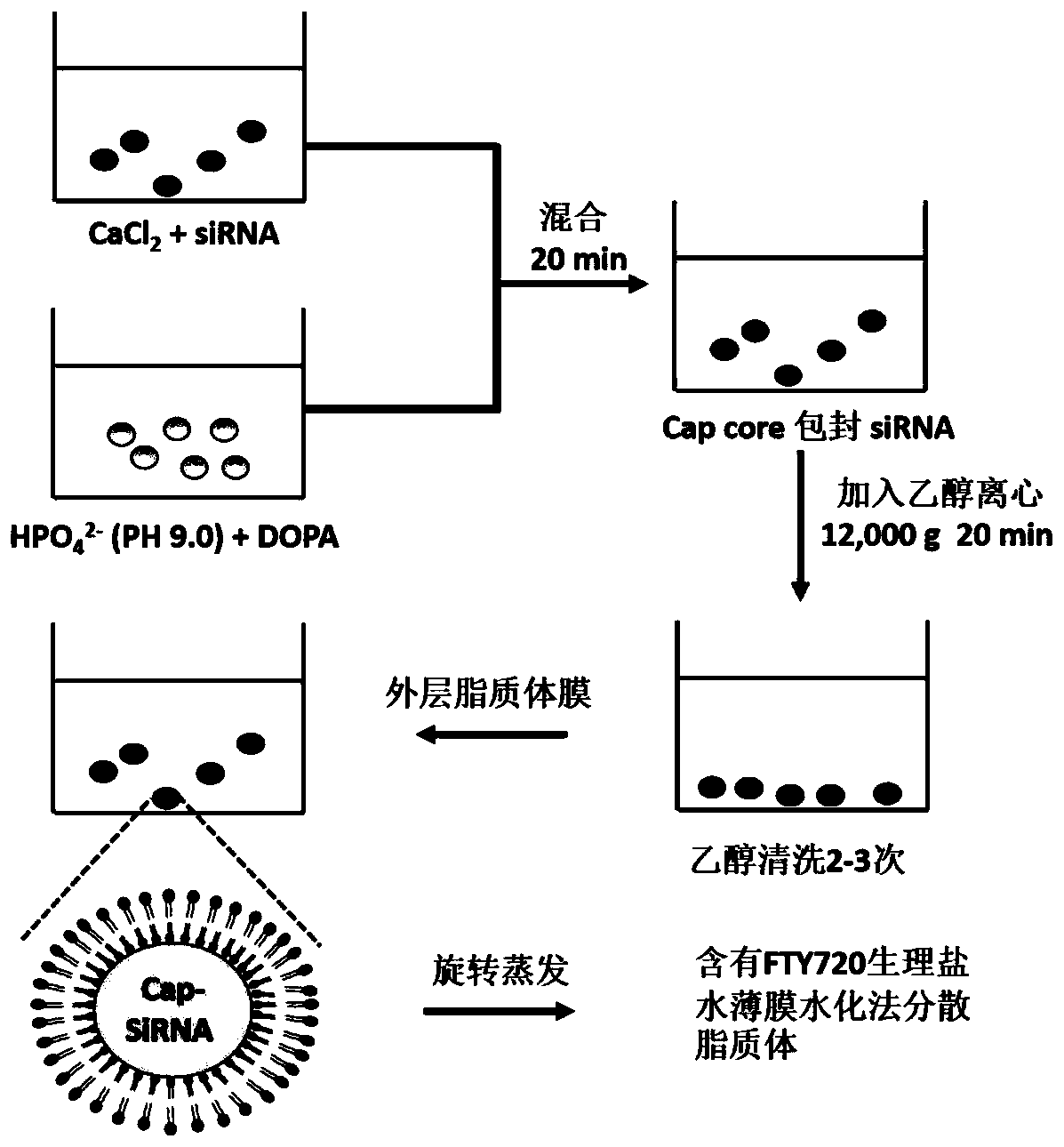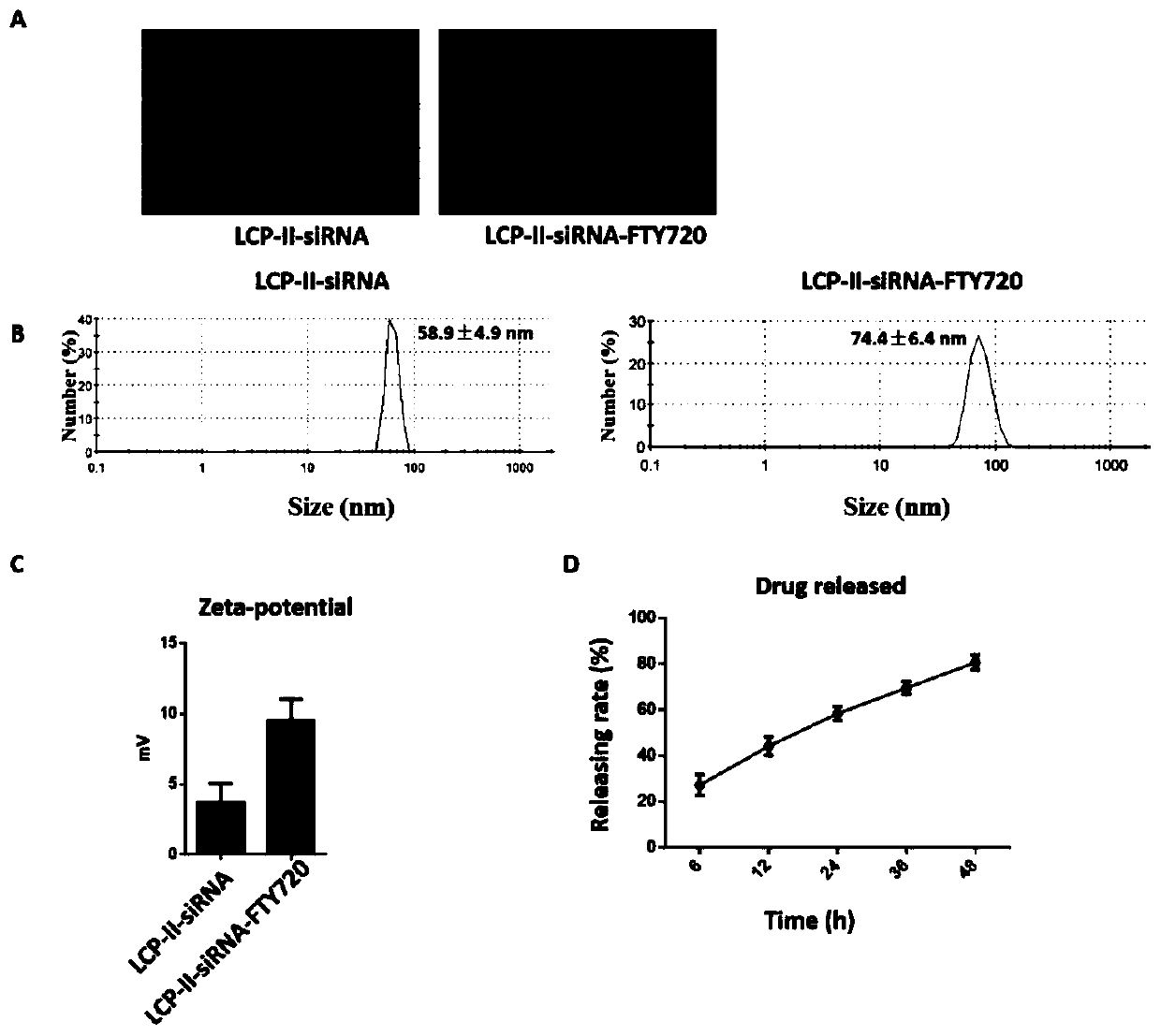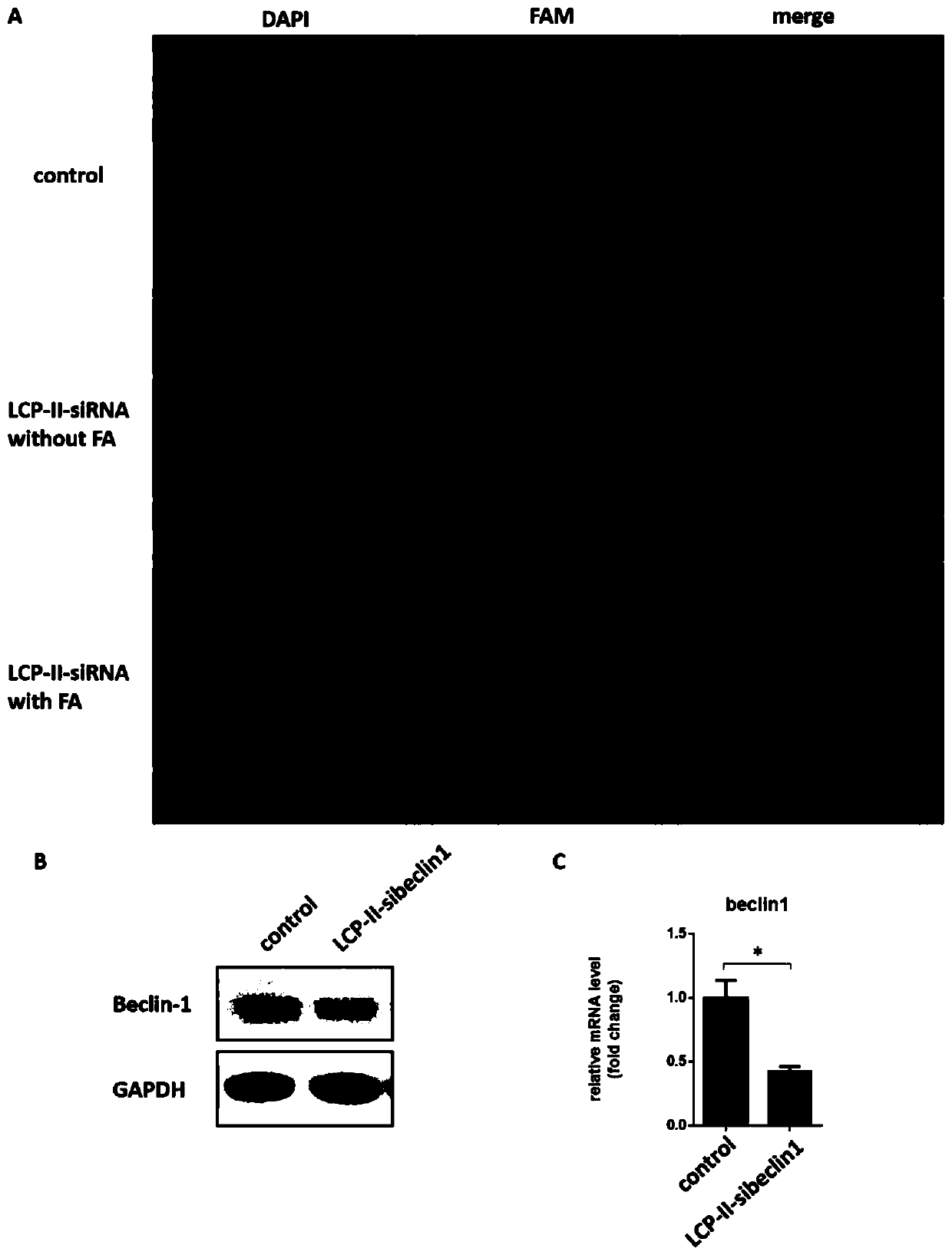Co-delivery of lipid nanoparticles with autophagy siRNA-fingolimod targeting liver cancer
A lipid nanoparticle and autophagy technology, which is applied in the fields of genetic material components, medical preparations with non-active components, and medical preparations containing active components, etc., can solve problems such as adverse reactions, difficult to achieve, and normal cell apoptosis. , to achieve the effect of synergistically inducing apoptosis of liver cancer cells
- Summary
- Abstract
- Description
- Claims
- Application Information
AI Technical Summary
Problems solved by technology
Method used
Image
Examples
Embodiment 1
[0028] Example 1 Preparation and Characterization of Nano Drug Delivery System LCP-II for Co-loading siRNA and FTY720
[0029] 1. Preparation, characterization and drug release experiment
[0030] 1. Preparation and characterization of nano drug delivery system LCP-II
[0031] The molecules that need to be co-loaded and delivered in the present invention are SiRNA and Fingolimod (FTY720, Fingolid), and the target protein of the SiRNA molecule is beclin1, which is used to knock down beclin1 to achieve the purpose of inhibiting autophagy.
[0032] First, 300μLCaCl 2 (500mM) and 100μL of siRNA (2mg / mL) were dispersed in 15ml of cyclohexane / surfactant (Igepal CO-520) mixture (71 / 29V / V) to prepare a water-in-oil microemulsion. Next, 300μL Na 2 HPO 4 (25mM pH=9.0) Disperse in another 15ml cyclohexane / surfactant (Igepal CO-520) mixture (71 / 29V / V), and add 200μL of DOPA dissolved in chloroform (20mg / mL) , In order to prepare the phosphoric acid phase. Then, the two were mixed and stirred fo...
Embodiment 2
[0041] Example 2 In vitro anti-tumor experiment of co-delivery of nano drug delivery system
[0042] 1. Material
[0043] 1,2-dioleoyl-3-trimethylammonium propane (DOTAP), dioleoyl phosphatidic acid (DOPA) and per1,2-distearoyl-sn-glycerol-3-phosphoethanolamine-N-[ Methoxy (polyethylene glycol 2000)] ammonium salt (DSPE-PEG) was purchased from Avanti Polar lipids in the United States. DSPE-PEG-FA was purchased from Xi'an Ruixi Biological Technology Co., Ltd. Cholesterol was purchased from Sigma. Fluorescence-labeled (FAM) beclin1 siRNA (target sequence 5'-CAGTTTGGCACAATCAATA-3') and control siRNA (target sequence 5'-AAT TCT CCGAACGTGTCACGT-3') were purchased from Shanghai Gema Gene Company.
[0044] 2. Cells and cell culture
[0045] Human hepatocellular carcinoma cell line SMMC-7721 was purchased from the Shanghai Chinese Academy of Sciences Cell Bank. The cells were cultured in complete medium. DMEM medium was supplemented with 10% fetal bovine serum and 100u / ml penicillin (purch...
Embodiment 3
[0067] Example 3 In vivo anti-tumor experiment of co-delivery of nano drug delivery system
[0068] 1. Experiment Mice and in vivo tumor studies
[0069] 1. Tumor research in nude mice
[0070] All animal studies were approved in accordance with the guidelines and regulations of the Animal Ethics Committee of Nanjing Gulou Hospital. Male nude mice (BALB / c nude mice) aged 4-6 weeks were purchased from the Experimental Animal Center of Shanghai Academy of Sciences. The SMMC-7721 cells were resuspended in PBS, and the nude mice were anesthetized by isoflurane infiltration. The cells were injected into the right armpit of the mice (25 mice, 5 mice in each group) (each mouse 200μL PBS containing 1× 10 7 Cells). The tumor volume is about 100mm after two weeks 3 The mice were randomly divided into 5 groups (PBS control group, LCP-II negative control group, LCP-II-FTY720 group, LCP-II-FTY720-sibeclin1 without FA group, LCPII-FTY720-sibeclin1 with FA group) And inject different compounds ...
PUM
| Property | Measurement | Unit |
|---|---|---|
| particle size | aaaaa | aaaaa |
Abstract
Description
Claims
Application Information
 Login to View More
Login to View More - R&D
- Intellectual Property
- Life Sciences
- Materials
- Tech Scout
- Unparalleled Data Quality
- Higher Quality Content
- 60% Fewer Hallucinations
Browse by: Latest US Patents, China's latest patents, Technical Efficacy Thesaurus, Application Domain, Technology Topic, Popular Technical Reports.
© 2025 PatSnap. All rights reserved.Legal|Privacy policy|Modern Slavery Act Transparency Statement|Sitemap|About US| Contact US: help@patsnap.com



